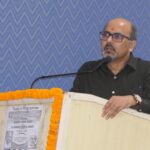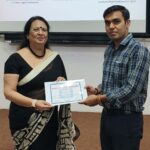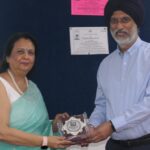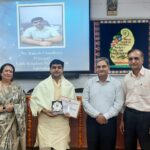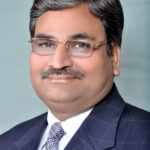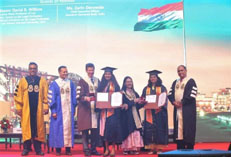
Innovation and agility required to handle threats to banking sector: Zarin Daruwala
New Delhi: Donning ceremonial convocation robes, 889 students of O.P. Jindal Global University (JGU) received their degrees at a glittering ceremony at the Indira Gandhi Stadium in Delhi last evening. The eighth Convocation and Founder’s Day celebrations also witnessed confident students marching into the world of work with some of them planning to pursue further higher studies in India and abroad. The graduates included two doctoral candidates from the Jindal Institute of Behavioural sciences and were from the Jindal Global Law School, Jindal Global Business School, Jindal School of International Affairs, Jindal School of Government and Public Policy and Jindal School of Liberal Arts and Humanities. In her special address, Ms. Zarin Daruwala, CEO of Standard Chartered Bank, India drew attention towards the disruptive role of global technology giants in the digital payment sector that are posing a major threat to banks in India. She noted the effort it took for investment bankers like herself to catch up with rapid technological innovations in the past two decades and said that the banking & financial services industry as a whole as well as our Indian economy need to embrace technological advancements. She remarked that doing so requires learning new tools and unlearning old techniques as well as agility and innovation. Ms. Zarin stressed the need for hard work and perseverance. In her message to graduating students, she said, “In your working career you will be confronted with numerous challenges. The fear of change should not stop you from taking up challenges. Take them as opportunities and you will excel in life. Perseverance overcomes resistance and that’s the major difference between success and failure. Speaking from her own experience and spelling out a formula for success, Ms. Zarin said, “Everybody who succeeds has to pass through the boulevard of hard work. Hard work beats talent when talent fails to work hard. You cannot be the strongest, you cannot be the fastest but you can certainly work the hardest. Hard work and dreams and dedication is equal to success.” “Once you have met your personal and familial goals, make goals for your society and become responsible citizens”, she added. In his Convocation Address, Professor David Wilkins, Vice Dean, Harvard Law School said “You must view this convocation as not the end of education but as the beginning. School is the easy part. The hard part is to learn to live in the real world. Education must be viewed as a life-long occupation and passion.” Quoting Mahatma Gandhi, he urged the students to learn for their lifetime and not for immediate future. He further added that “You are the change we have been waiting for”. Urging them to shape future, he said, “the best way to predict the future is to invent it.” Applauding the vision of JGU as a sustainable, scalable and adaptive model of institutional development, Professor Wilkins stressed the need for multidisciplinary institutions which are essential for the growth of young minds. Referring to the steps being taken by India to address some of its current challenges, he said that Indian experience can be helpful for other countries. “India has much to teach the rest of the world,” he added. Prof. David paid glowing tributes to the outstanding corporate philanthropy of Mr. Naveen Jindal in the establishment of O.P. Jindal Global University. JGU Founding Chancellor, Mr. Naveen Jindal, congratulated the JGU fraternity for entering world university rankings and UGC’s recommendation of JGU as an `Institution of Eminence’. Encouraging the students to realize their dream, he said, “Now is not the era for multitasking. We need to figure out what matters most to us and give it our undivided attention. This is what will give us best results. Our ancient Indian philosophy Vedanta teaches us to follow Swadharma and not Paradharma. Swadharma is following our own nature, doing what your inner calling is and not what someone else asks us to do.” Emphasizing the importance of good education, Mr. Jindal further noted, “Quality higher education contributes to economic development and human development of a nation. JGU has progressively enhanced its reputation as a quality higher education provider from the National, Regional to the Global. This has been possible for our exemplary pool of faculty, globally competitive curriculum and pedagogy and excellent achievements of our alumni.” In his welcome address, Professor Raj Kumar, Founding Vice-Chancellor, JGU said, “JGU, as an institution, is committed to public service and national progress. In addition, JGU has placed the pursuit of institutional excellence at the core of its mission since its inception. We are conscious that education is much more than merely awarding degrees. In India today, we are faced with enormous challenges relating to higher education. JGU has been deeply conscious of fulfilling its commitment to public service and addressing some of the larger challenges in the higher education sector in India,” he added. The Vice-Chancellor also presented the annual university report. Speaking on the occasion, Registrar, JGU, Prof. Y.S.R. Murthy referred to the exponential growth of JGU from a mere 69 students from 3 degree programmes in the first convocation held in 2012 to 889 students from 13 different programmes at the eighth convocation held in 2019. Referring to 123 PhD candidates enrolled in our doctoral studies programme across different Schools, he expressed hope that doctoral research programme will grow significantly in the years to come. The guests of honour and dignitaries paid floral tributes to Mr. O.P. Jindal on his 89th birth anniversary. Recently, Jindal Global University was recommended for declaring as an ‘Institution of Eminence’ by the UGC. In June 2019, QS World University Ranking (WUR) 2020 was released worldwide. Out of more than 28,000 universities in the world, less than 4% were ranked by QS in terms of their performance criteria. 23 Indian universities entered these rankings this year while JGU was the sole new entrant. It is now placed amongst the top 2.67% of all universities globally. JGU was also ranked by QS in the global top 150 amongst all young universities that are under 50 years of age.



